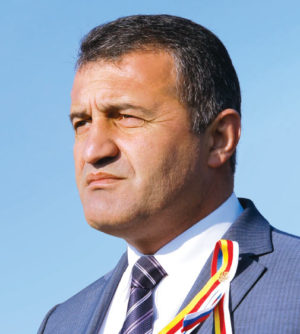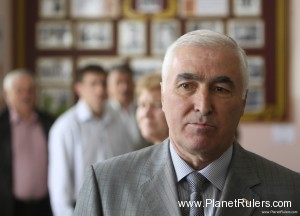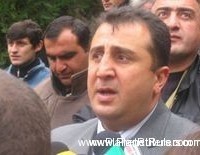Anatoly Bibilov, President of South Ossetia (Elected on Apr 9, 2017 with 54.8% of the vote)
 Anatoliy Ilyich Bibilov (born February 6, 1970) is a Russian and South Ossetian military officer, currently serving as the 4th President of South Ossetia, a partially recognized, but de-facto independent state, succeeding Leonid Tibilov as President on April 21, 2017, following his election victory.
Anatoliy Ilyich Bibilov (born February 6, 1970) is a Russian and South Ossetian military officer, currently serving as the 4th President of South Ossetia, a partially recognized, but de-facto independent state, succeeding Leonid Tibilov as President on April 21, 2017, following his election victory.
Bibilov was born in the South Ossetian AO of the Georgian SSR in the Soviet Union. After eight grade he went to a boarding school in Tbilisi with intensive military and physical training, thereafter he joined the Ryazan Higher Airborne Command School. After graduating, Bibilov was distributed to the 76th Guards Air Assault Division. His division was included in the consolidated battalion of peacekeepers in South Ossetia. Subsequently he joined the South Ossetian Army, commanding a special forces unit. Between the period 1998-2008 he rejoined the peacekeeping forces, this time in a North Ossetia battalion. Bibilov took an active part in the 2008 South Ossetian war, organizing the defence of one of the districts of Tskhinvali against the Georgian Armed Forces.
In October 2008 he was appointed Minister of Emergency Situations of South Ossetia. Bibilov was the presidential candidate for the Unity Party in the South Ossetian presidential election, 2011. He won the first round, but lost the runoff to Alla Dzhioyeva.
Soon however, the parliament of South Ossetia declared the elections invalid. Leonid Tibilov was ultimately elected president after winning the South Ossetian presidential election, 2012 which Bibilov didn’t participate in. In June 2014 he was elected as the president of the parliament of South Ossetia. He is currently the head of the United Ossetia party, which nominated him for their candidate to the South Ossetian presidential election, 2017. Bibilov won the election in the first round by getting 54.8% of the vote and took office as the 4th president of South Ossetia on the 21 April 2017. During his inauguration a delegation from the Nagorno-Karabakh Republic was present.
Source: https://en.wikipedia.org/wiki/Anatoliy_Bibilov
Leonid Tibilov, Former President of South Ossetia (Elected on Apr 8, 2012)
 Leonid Tibilov (born 28 March 1952 in Verkhny Dvan, Znaur district) is a South Ossetian politician who is the President-elect of South Ossetia after winning the 2012 South Ossetian presidential election.
Leonid Tibilov (born 28 March 1952 in Verkhny Dvan, Znaur district) is a South Ossetian politician who is the President-elect of South Ossetia after winning the 2012 South Ossetian presidential election.
Leonid Tibilov is a former head of the KGB in South Ossetia from 1992 to 1998. He was then a first deputy prime minister and co-chaired a Georgian-Ossetian peacekeeping commission. Tibilov stood at the 2006 presidential election losing to Eduard Kokoity, who won 98% of the vote.
Before the 2012 election Tibilov distanced himself from the outgoing President Eduard Kokoity. Tibilov is reported to be loyal to Russia and pledged to consult Russia before appointing a government if he was successful at the election.
In the first round of the 2012 Presidential election, Tibilov received 42.5% of the vote to lead David Sanakoyev. In the second round Tibilov was elected president with 54% of the vote.
The president of South Ossetia, Eduard Kokoyty, resigned on December 10, 2011. Prime Minister Vadim Brovtsev will be acting president from December 11 until the new presidential election scheduled for March 25, 2012.
Eduard Kokoyty, Former President of South Ossetia
(Кокойты Эдуард Джабеевич) born on October 31, 1964 in Tskhinvali.
Professional career started as an electrical engineer. Graduated South Ossetian Pedagogical Institute in 1987. While he was a student, he was elected as the secretary of the committee of communists at the university.From 1988-1989 was a secretary and then from 1989-1991 he was the first secretary of the city of Tskhinvali communist party.
During Georgia-Ossetia conflict, he created and headed the fighting division of the “defenders of Ossetia.”
From 1990-1993 he was a deputy of the Parliament of South Ossetia.
In 1993 he created a sports charity fund “Youth.”
In 1997 he was appointed as the Trade Representative-Minister of South Ossetia to Russia.
Then, he was an advisor to the deputy of Russian Parliament, A. Chekhoev.
Married. Has 3 sons.
Dmitry Sanakoev, Alternative President of South Ossetia
Dmitry Sanakoev (born in 1969) is a South Ossetian politician. He claims to serve as President of South Ossetia, a secessionist republic officially recognised as being part of Georgia, after winning alternative elections organised by the opposition to the de facto incumbent, Eduard Kokoity. He is recognised neither by the de facto government in Tskhinvali, the entity’s capital, or by the international community at large, which does not recognise the existence of a South Ossetian government at all.
Sanakoyev fought on the Ossetian side during the Georgian-Ossetian conflict in the early 1990s. Later, he served as defense minister and then as prime minister for several months in 2001 under Kokoity’s predecessor, Lyudvig Chibirov, but left South Ossetia for Moscow after Kokoity came to power.
On November 13, in a so-called “alternative” poll organized by The Salvation Union of South Ossetia in Georgian- and Ossetian villages not controlled by the separatists, Sanakoyev was declared the president-elect, with more than 80 percent of the vote. His campaign posters were prominently posted on walls outside polling stations in Georgian-controlled villages, benefited from extensive media coverage in the Georgian press. His election manifesto envisaged the restoration of the region’s status as a republic within Georgia and a program of measures to spur economic growth.
At his November 13 press conference, Kokoity termed Sanakoyev and Karkusov, head of the alternative election commission and a former advisor to Kokoity, “traitors to their homeland and traitors to the South Ossetian people.” The South Ossetian media launched a campaign to discredit and compromise Sanakoyev, accusing him of corruption, duplicity, and collaborating with Georgian intelligence.
In December 2006, Sanakoyev formed his government, choosing not to include the post of defense minister.


